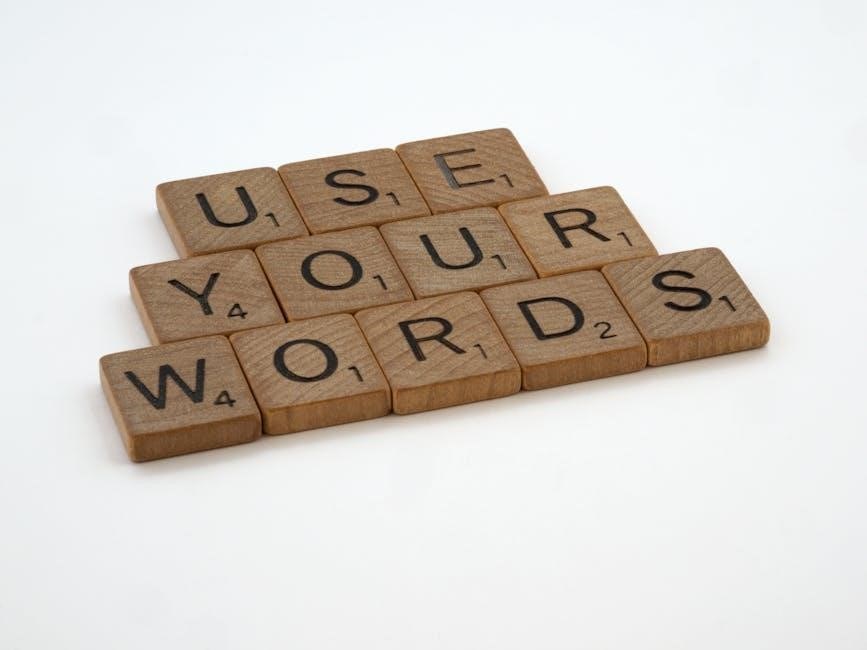Welcome to the 4th Grade Vocabulary Words PDF, a comprehensive resource designed to enhance your child’s language skills․ This guide offers a curated list of high-frequency words, engaging activities, and practical exercises to strengthen vocabulary․ Perfect for teachers and parents, it includes interactive elements and printable worksheets․ Each word is carefully selected to align with curriculum standards, ensuring academic success and improved communication․ Make learning fun and effective with this invaluable educational tool!
1․1 Importance of Vocabulary Development in 4th Grade
Vocabulary development in the 4th grade is crucial as it enhances reading comprehension, communication, and academic performance․ At this stage, students expand their ability to understand complex texts and express ideas clearly․ A strong vocabulary foundation improves performance in all subjects, including standardized tests․ It also fosters critical thinking, writing, and speaking skills, preparing students for future academic challenges․ Consistent practice and meaningful instruction are essential for mastery․
1․2 Overview of the 4th Grade Vocabulary Curriculum
The 4th grade vocabulary curriculum focuses on expanding students’ word knowledge through high-frequency and Tier II words․ Selected from basal readers and state tests, these words are essential for comprehension and communication․ The curriculum builds on earlier grades, introducing complex meanings and contexts․ It includes activities like matching games, fill-in-the-blanks, and word inventories to engage students․ Regular practice and review ensure mastery, preparing students for advanced academic challenges․ Supplementary materials, such as worksheets and flashcards, reinforce learning and make it accessible for all learners․

Benefits of Using a PDF Format for Vocabulary Learning
PDFs offer convenience, accessibility, and printability, making vocabulary learning flexible․ Interactive features like fillable exercises and clickable links enhance engagement, while clear formatting ensures readability․ Ideal for both home and classroom use․
2․1 Convenience and Accessibility of PDFs
Pdfs are highly convenient and accessible, allowing easy downloading, printing, and sharing․ They can be viewed on multiple devices, making learning flexible; Interactive features like fillable exercises and clickable links enhance engagement․ Clear formatting ensures readability, while answer keys provide immediate feedback․ This format supports both home and classroom learning, making vocabulary practice effortless and enjoyable for students․
2․2 Interactive Features in Vocabulary PDFs
Interactive features in vocabulary PDFs enhance learning through engaging tools like fillable exercises, clickable links, and embedded audio․ These elements allow students to practice and review vocabulary dynamically, promoting better retention and understanding․ Interactive PDFs turn static content into a hands-on learning experience, making vocabulary acquisition fun and effective for 4th graders․

How to Create an Effective 4th Grade Vocabulary PDF
Designing an effective vocabulary PDF involves organizing words thematically, including definitions, examples, and visuals․ Ensure content aligns with curriculum standards and is visually appealing for young learners․
3․1 Structuring the Vocabulary List
Organize words alphabetically or by theme to enhance learning․ Group related terms and include definitions, examples, and visuals․ Ensure the list aligns with curriculum standards and is easy to navigate․ Break down words into manageable sections for weekly practice․ This structure helps students gradually build vocabulary and retain information effectively․ Make it visually appealing with clear fonts and spacing for better focus․
3․2 Incorporating Definitions and Examples
Provide clear, concise definitions for each word, using simple language․ Include example sentences to demonstrate proper usage in context․ This helps students understand how words function in real-life scenarios․ Pairing definitions with relatable examples enhances comprehension and retention․ Use visuals or diagrams to further illustrate meanings, ensuring students grasp nuances․ This approach fosters deeper understanding and encourages active application of vocabulary․
3․3 Adding Visual Aids and Illustrations
Enhance vocabulary learning by incorporating images, diagrams, and charts to visually represent word meanings․ Illustrations help students connect words to real-life contexts, making abstract concepts more tangible․ Use color-coded highlights or infographics to break down complex terms․ Visual aids cater to visual learners and make the PDF engaging․ Align images with curriculum standards to ensure relevance and effectiveness for 4th graders․
Tips for Teaching 4th Grade Vocabulary Words
Engage students with interactive activities like word games, role-playing, and storytelling․ Use visual aids to illustrate meanings and encourage repetition for better retention․ Apply words in real-life contexts to deepen understanding and make learning enjoyable for 4th graders․
4․1 Engaging Activities to Reinforce Vocabulary
Implement interactive and fun activities like word games, role-playing, and storytelling to make vocabulary learning exciting․ Use flashcards, crossword puzzles, and matching games to reinforce word recognition․ Incorporate visual aids such as pictures and diagrams to help students connect words with meanings․ Encourage students to use vocabulary in sentences and apply words to real-life scenarios for better retention and deeper understanding․
4․2 Strategies for Effective Vocabulary Instruction
Effective vocabulary instruction involves pre-teaching unknown words, using context clues, and providing student-friendly definitions․ Incorporate visual aids like diagrams and pictures to enhance understanding․ Encourage active participation through discussions and group activities․ Use repetition and spaced practice to reinforce learning․ Integrate technology tools, such as interactive apps and online games, to make lessons engaging․ Regularly assess progress to tailor instruction and ensure mastery of the vocabulary․

Common Challenges in Vocabulary Learning
Students often struggle with vocabulary retention, understanding multiple meanings, and applying words correctly in context․ These challenges can hinder comprehension and communication, requiring targeted strategies to address them effectively․
5․1 Overcoming Vocabulary Learning Obstacles
Common challenges include difficulty retaining words, understanding context, and applying vocabulary in sentences․ To overcome these, use flashcards, create word associations, and practice with interactive exercises․ Encourage students to use words in writings or conversations․ Provide visual aids and break words into parts for better retention․ Regular practice and positive reinforcement also help build confidence and improve vocabulary skills effectively․
5․2 Addressing Different Learning Styles
Engage students by catering to their learning styles: visual, auditory, or kinesthetic․ Use word cards and colorful flashcards for visual learners, while vocabulary songs or audio resources can help auditory learners․ Kinesthetic learners benefit from hands-on activities like word-building games or writing exercises․ Tailoring instruction to individual preferences ensures all students can effectively grasp and retain new vocabulary, fostering a more inclusive learning environment․

Top 4th Grade Vocabulary Words to Know
Mastering these vocabulary words is essential for 4th graders․ High-frequency words like “analyze,” “context,” and “narrate” enhance reading and communication skills․ This curated list ensures academic success․
6․1 High-Frequency Vocabulary Words
High-frequency vocabulary words are essential for 4th graders, as they appear regularly in texts and tests․ Words like “analyze,” “narrate,” and “context” are selected from basal readers and state tests․ These words improve reading comprehension and communication skills․ Mastering them helps students excel academically and enhances their ability to express ideas clearly․ Regular practice with these words ensures long-term retention and confidence in language use․
6․2 Tier II Vocabulary Words for 4th Grade
Tier II vocabulary words are high-utility words that appear frequently across various subjects․ For 4th graders, these include words like “accomplish,” “adaptation,” and “calculate․” They are selected from basal readers and state tests to ensure relevance․ These words enhance reading comprehension and writing skills, providing a strong foundation for academic success․ Regular practice helps students master their meanings and usage in different contexts․

Practice Exercises and Worksheets
Engage students with vocabulary-building exercises and worksheets designed to reinforce learning․ Activities include matching games, fill-in-the-blanks, and crossword puzzles․ Answer sheets are provided for easy assessment and feedback․
7․1 Vocabulary Building Exercises
Enhance learning with interactive vocabulary-building exercises tailored for 4th graders․ These activities include word matching, crossword puzzles, and sentence completion tasks․ Each exercise focuses on high-frequency words, ensuring students grasp meanings through repetition and application․ Worksheets are designed to be engaging, with visuals and clear instructions․ Answer keys are provided for easy grading and feedback, making it a valuable resource for both teachers and parents․
7․2 Worksheets for Vocabulary Reinforcement
Reinforce vocabulary learning with specially designed worksheets that cater to 4th graders․ These printable resources include word searches, fill-in-the-blank sentences, and matching exercises․ Each worksheet focuses on specific vocabulary words, providing opportunities for practice and review․ Visual aids, such as pictures, are often included to enhance understanding․ Answer keys are provided for easy grading, ensuring students can track their progress and improve effectively․
The Role of Technology in Vocabulary Learning
Digital tools and interactive vocabulary PDFs enhance learning through engaging activities and gamification, making it fun for students to practice and master new words effectively online․
8․1 Digital Tools for Vocabulary Practice
Digital tools like interactive vocabulary PDFs, online flashcards, and educational apps provide engaging ways to practice vocabulary․ Platforms such as Kahoot! and Quizlet offer gamified exercises, making learning fun and accessible․ These tools allow students to practice anywhere, anytime, and often include features like audio pronunciations and progress tracking․ They cater to different learning styles, ensuring every student can engage effectively and build their vocabulary skills confidently․
8․2 Gamification of Vocabulary Learning
Gamification transforms vocabulary practice into an engaging experience․ Platforms like Kahoot! and Quizlet use badges, points, and leaderboards to make learning fun․ Interactive games and competitions motivate students to practice regularly․ This approach fosters a competitive yet supportive environment, encouraging active participation and improving retention․ Gamified tools also provide immediate feedback, helping students track progress and stay excited about building their vocabulary skills․

Assessing Vocabulary Mastery
Assessing vocabulary mastery involves evaluating students’ understanding through quizzes, class discussions, and written exercises․ Regular formative assessments track progress, while summative tests measure long-term retention and application skills effectively․
9․1 Formative Assessments for Vocabulary
Formative assessments are regular, informal evaluations used to monitor vocabulary progress․ They include quizzes, class discussions, and quick written exercises to gauge understanding․ These tools help identify learning gaps and adjust teaching strategies․ For example, quizzes can test word meanings, while discussions allow students to apply vocabulary contextually․ The insights gained ensure instruction remains targeted and effective throughout the learning process․
9․2 Summative Assessments for Vocabulary
Summative assessments evaluate vocabulary mastery at the end of a unit or term․ They include comprehensive tests, projects, or oral presentations that measure long-term understanding․ These assessments provide a clear picture of students’ ability to recall and apply vocabulary words․ Results help teachers identify areas of strength and weakness, guiding future instruction and ensuring students meet learning goals effectively․

Real-Life Applications of Vocabulary Words
Vocabulary words are essential for clear communication in daily life․ Students can apply these words in writing stories, engaging in conversations, and understanding complex texts․
10․1 Using Vocabulary in Writing
Using vocabulary words in writing enhances clarity and creativity․ Encourage students to incorporate these words into essays, stories, and journals․ Provide prompts that naturally fit the words, fostering better expression and understanding․ This practice helps students apply their knowledge in meaningful ways, improving their writing skills and confidence in using new vocabulary effectively․
10․2 Applying Vocabulary in Conversations
Applying vocabulary in conversations helps students connect words to real-life contexts․ Encourage role-playing, group discussions, or sharing stories using the new words․ This practice builds confidence and fluency in communication․ Teachers and parents can model correct usage, providing opportunities for students to engage in meaningful dialogue․ Such activities make learning interactive and enjoyable, reinforcing vocabulary retention and practical application in everyday speech․

Additional Resources for Vocabulary Development
Explore recommended books and websites to supplement vocabulary learning․ Utilize online tools, educational apps, and interactive platforms to enhance engagement and deepen understanding of 4th-grade vocabulary words․
- Visit educational websites for interactive vocabulary games․
- Download vocabulary-building apps for daily practice․
- Check out recommended books that incorporate target words․
11․1 Recommended Books and Websites
Enhance vocabulary learning with these recommended resources․ Books like “240 Vocabulary Words Kids Need to Know” offer comprehensive word lists․ Websites such as k5learning․com provide interactive games and exercises․ Additional tools include educational apps like Vocabulary Spelling City and Quizlet, which offer flashcards and quizzes․ These resources support engaging and effective vocabulary development for 4th graders, making learning fun and accessible․
11․2 Supplementary Materials for Vocabulary Learning
Supplement your vocabulary lessons with flashcards, word walls, and interactive PDFs․ Flashcards provide quick word recognition practice, while word walls create a visual learning environment․ Crossword puzzles, word searches, and matching games make learning engaging․ Additionally, teacher-created resources like vocabulary cards and activity sheets enhance retention․ Many PDFs include bonus features such as fill-in-the-blank exercises and word-based games, catering to diverse learning styles and preferences․
12․1 Summary of Key Points
Mastering 4th grade vocabulary words is essential for improving communication and academic success․ This PDF provides a structured list of high-frequency words, interactive activities, and practical exercises․ It aligns with curriculum standards, offering tools for effective learning․ The resource supports teachers and parents in creating engaging lessons, ensuring students build a strong foundation in language skills․ Regular practice and review are key to reinforcing vocabulary mastery and fostering lifelong literacy․
12․2 Final Thoughts on Vocabulary Development
Developing a strong vocabulary is empowering for young learners, enhancing both communication and academic performance․ The 4th Grade Vocabulary Words PDF serves as an invaluable tool, offering high-frequency words, engaging activities, and practical exercises․ By fostering a love for learning and encouraging regular practice, this resource helps students build a robust foundation for lifelong literacy and future success․ Consistent effort and creative teaching methods ensure lasting vocabulary mastery and a deeper understanding of language․



